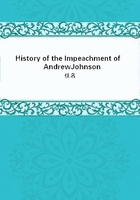
第28章 FIRST ATTEMPT TO IMPEACH THE PRESIDENT.(6)
Ans.--In all instances, I think such roads have been surrendered in the same manner as if they had been constructed by the companies. That subject was talked of a good deal in conference between myself and the Quartermaster General. My own views, that the great object on the part of the Government, was to get these roads operated; and that to go into an inquiry as to the cost of construction, would be impracticable, either as to the cost of construction or as to any certain rule of compensation, because many of them were constructed under the pressure of war, and for temporary Purposes. The object of arriving at the cash value or equivalent for the roads was not only impracticable, but really of very little practical interest in comparison with the great end of having the channels of commerce in the rebel states opened and carried on, with a view of getting out their produce, furnishing supplies, and getting commerce in its regular channels. In my own view, that appeared to be the most, certain and most speedy system of reconstruction we could adopt, and that it would tend more to establish harmony than any other thing that could be done by the Government. In view of all this, and after the most deliberate consideration we could give it, it was the opinion of the Quartermaster General and myself--certainly my own--that it would be impracticable to make any distinction: and so far as I know, no distinction was made in any part of the country in reference to roads built by the Government and roads that had been constructed by Companies before the war commenced.
Mr. Stanton was asked this question:
Suppose the Government, at his own expense, had constructed seventy miles of railroad in one of the rebel States, and that, at the close of the war, a company should apply to the Executive Department of the Government for a transfer of the road so constructed to it; by what authority or provision of law would Executive Department be authorized to transfer the road so constructed to the company making the application?
Mr. Stanton answered:
I do not know of any act of Congress that directly, in terms, would authorize any such transfer; but regarding the construction of the road, in time of war, simply as a means, or instrument, of carrying on war, when the war was over I would consider it strictly proven and within the scope of the power of the General Commanding, or especially of the President of the United States, as the Commander-in-Chief of the Army, to render that instrument as available for peace purposes as possible. And inasmuch as the road would be entirely useless unless it was operated, and it would be for the benefit and interest of the public, to have it operated as speedily as possible, I think it would be in the interest of a wise discretion, and exercising proper authority, to turn over that road to any company or individual who would operate it; for, in that way, he would be applying the war material to the only available use to which it could be applied.
* * * I would regard the rolling stock as coming, to a certain extent, within the same principle. * * * No transfer of title was at any time made, so far as I know, or could be made, but only possession turned over. When the military use was no longer required, the railroads were turned over to their original owners, or their representatives, with permission to use them.
These railroads, their plant and track fixtures, real property, of which the military authorities had only the possessory right and use, but the rolling stock and equipments, and iron not laid down, were personal property, which, by capture, or purchase, or construction, belonged to the United States. Sale could be made, and was made, of the personal property at values estimated by the proper officers. That which constituted real estate, to-wit, the railroad track, fixtures, etc., the military authorities might abandon altogether, or relinquish control and turn over possession to those who would make a beneficial use of it by working the road. Being in the nature of real estate, no title of the Government or of other persons could be divested and conveyed by military authority, but only the control relinquished and the use permitted during the existence of military authority in the department where the roads were situated.
The trend of a large portion of the testimony of witnesses called by this committee to testify as to the charges preferred against Mr. Johnson and relating to other allegations of the indictment, quite clearly indicated that the charges were based solely upon common street rumor, invented and given currency in partisan antagonism and for partisan purposes, and that the witnesses were called in the hope and expectation, on the part of the majority of the House, of developing proof of disloyalty and corruption on the part of the President, and, if not criminal connivance, at least, criminal knowledge of a conspiracy for the assassination of Mr. Lincoln.
But these expectations and hopes, in all respects, were so utterly disappointed, that there was pathos, at least, as the investigation was protracted from month to month, with no indication of the hoped for development, in the despondent inquiry of Mr. Thaddeus Stevens to one of his colleagues of the Impeachment Committee, as the inquest approached a close without results--"Well, HAVE YOU GOT ANYTHING, ANYHOW?" It was more an ejaculation of anger and disgust at failure, than a query of one seeking hoped for information.